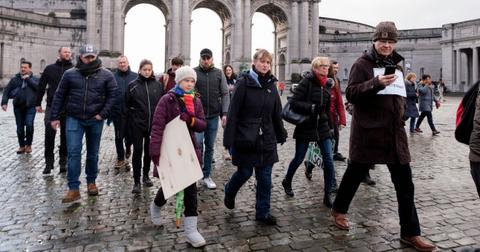Conservative politicians from Texas lieutenant governor Dan Patrick to President Donald Trump are eager to get Americans back to wor...
Conservative politicians from Texas lieutenant governor Dan Patrick to President Donald Trump are eager to get Americans back to work while healthcare workers continue to face overwhelming volumes of patients battling COVID-19. It seems the physical and economic wellbeing of the country are at odds right now in terms of which should take priority. In response to those who would choose the economy over containing the novel coronavirus, many are now calling for a general strike.
This mass protest strategy is nothing new, but it may be unfamiliar to Americans, so here is a brief explainer on what a general strike is, why people are calling for one, and the precedent for such a move.
“Up here risking our life for chicken.” Our society treats workers as disposable today and every day. #NotDying4WallStreet #GeneralStrike twitter.com/iramiof/status…
584 people are talking about this
So, what exactly is a general strike?
Everyone has heard of a strike before, which usually happens when the workforce for a given business or members of a trade union or guild collectively agree to stop all work. Usually, a strike is a tactic to force an employer or many employers in a union or guild industry to renegotiate terms, improve work conditions, or raise compensation.
A general strike has the same idea, but on a wider scale, and instead of targeting a specific employer or industry, protestors are usually seeking action on the part of the government. General strikes have been around as long as people have been oppressed, so basically since forever, but their heyday was definitely during the height of the Industrial Revolution.
Has there ever been a general strike in the U.S.?
I guess that depends on your definition. During the American Civil War, black enslaved people and underpaid white plantation workers abandoned the fields en masse, and this has been characterized as a general strike by no less an authority than W.E.B. Du Bois. However, one could argue that these people were not so much fighting for better work conditions as they were escaping their kidnappers and torturers.
W.E.B. Du Bois
Here's why some Americans are calling for a general strike now.
It's a fair question since, in a significant portion of the country, people are already staying home from work, though a number of us are fortunate to be able to continue working remotely. However, the cries for a general strike now are a direct response to many conservative lawmakers' demands or urgings that we abandon the work and travel restrictions we've adopted to help flatten the curve of new coronavirus infections.
Their argument is that the damage to our economy will do more harm to the general populace than allowing the virus to run its course. And those who oppose this reasoning feel returning to business as usual would not only result in thousands, if not millions, of unnecessary deaths but also would not actually benefit the economy, either.
I didn’t survive cancer, a terrorist bombing, and malaria to die for Wall St.
I’m a 60 year old single mom with a history of recurrent pneumonia putting two kids through college on my own with more books to write and more #fracking to ban.
#NotDying4WallStreet
1,681 people are talking about this
Many who protest the idea of lifting the restrictions meant to enforce mass social distancing say if leaders like Trump and Patrick get their way, they will lead a general strike in protest. The sentiment was often accompanied with the hashtag #NotDying4WallStreet.
As many proponents emphasize, people are the economy, and those who worry more about the long-term effects of this economic upheaval aren't seeing the forest for the trees. Economies recover, but death is... rather permanent.
Even Britney Spears seems to be calling for a strike with her latest Instagram post.
There are some recent examples of general strikes with varying degrees of success.
The most recent example of a general strike is technically ongoing in Hong Kong. Though containment of COVID-19 has taken top priority there, the fight to preserve the region's political autonomy continues in spirit. Citizens in Iran also engaged in a number of general strike protests from 2018 to 2019 in the face of economic instability, water shortages, and government corruption. And in 2005, a Bolivian general strike over the country's gas reserves led then president Carlos Mesa to resign.
And the general strike that perhaps made the most headlines last year was Earth Strike, a youth-led strike fighting for changes to global environmental policy, with climate change activist Greta Thunberg leading the charge.
A general strike to keep current social distancing measures in place may not be necessary, however, as the backlash against a premature reopening of the economy grows. Medical experts universally agree the consequences of lifting orders for non-essential workers to stay home will lead to far more long-term economic upheaval than would a universally mandated order to shelter in place.



